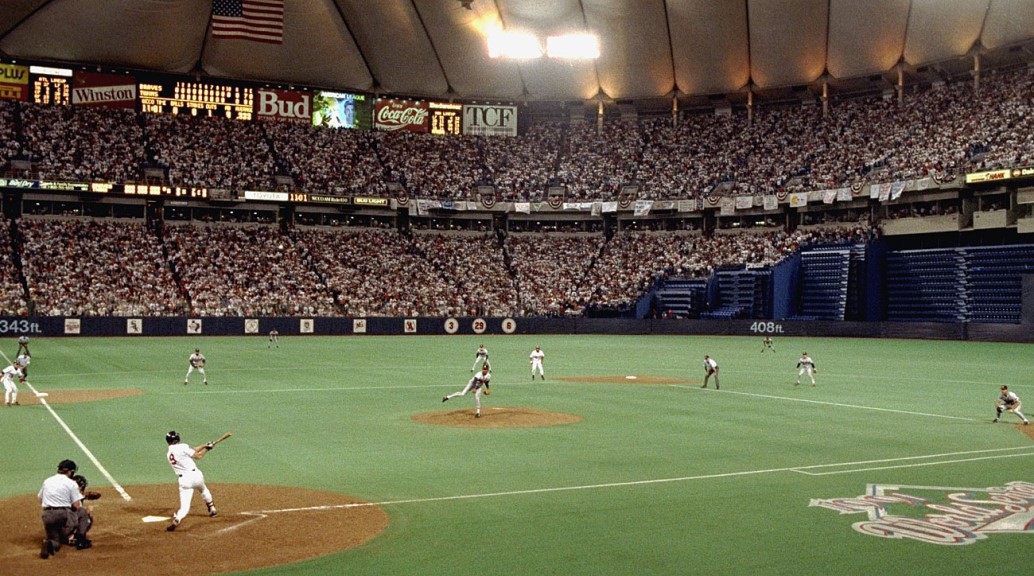MINNESOTA 1, ATLANTA 0 IN MINNESOTA (10 INNINGS)
Date: Sunday, October 27.
Batting stars: Dan Gladden was 3-for-5 with two doubles. Brian Harper was 2-for-4.
Pitching star: Jack Morris pitched ten shutout innings, giving up seven hits and two walks and striking out eight. He threw 126 pitches.
Opposition stars: John Smoltz pitched 7.1 scoreless innings, giving up six hits and a walk and struck out four. Lonnie Smith was 2-for-4 with a walk.
The game: Obviously there was no score through nine innings, so we'll detail the threats. In the second, the Twins got a pair of two-out singles. With one out in the third, Rafael Belliard singled and Smith walked. Gladden hit a one-out double in the bottom of the third but did not advance.
The Braves had a significant threat in the fifth. Mark Lemke led off with a single, was bunted to second, and went to third on Smith's infield single. But Terry Pendelton popped up and Ron Gant struck out to end the inning.
The big threat came in the eighth. Smith singled and Pendleton doubled, putting men on second and third with none out. This was the famous Chuck Knoblauch deke play, where he fooled Smith by pretending to field a ground ball and throw to second. Still, Atlanta had the middle of their order coming to bat. But Gant grounded out, David Justice was intentionally walked, and Sid Bream hit into a 3-2-3 double play to keep the game scoreless.
The Twins had a threat of their own in the ninth. Chili Davis and Brian Harper led off with singles. Shane Mack hit into a double play, but pinch-runner Jarvis Brown was still on third with two out. But pinch-hitter Paul Sorrento struck out and the game continued.
The Braves went down in order in the top of the tenth. Gladden led off with a bloop double in the bottom of the tenth. Knoblauch bunted him to third. Kirby Puckett and Kent Hrbek were both intentionally walked, loading the bases. With the outfield drawn in, pinch-hitter Gene Larkin then hit a fly ball to left-center, which fell for a hit and won the game and the series for the Twins.
WP: Morris (4-0). LP: Alejandro Pena (0-1). S: None.
Notes: Randy Bush pinch-hit for Greg Gagne in the eighth. Al Newman then pinch-ran for Bush and stayed in the game at shortstop. In the ninth, Brown pinch-ran for Davis and Sorrento pinch-hit for Newman. Scott Leius came into the game in the tenth at shorstop. Larkin pinch-hit for Brown in the tenth.
What a game. If you've watched it, there's probably not much I can tell you about it that you don't know. If you haven't, I probably can't do it justice.
Morris pitched about as good a game as you will ever see anyone pitch in that situation.
Gladden gets a lot of credit for aggressive baserunning in the tenth, and I guess he deserves it, but I remember thinking as I saw the ball dropping in that it should be a double.
I always think about how close Jarvis Brown came to being a World Series hero. When he pinch-ran in the ninth, he came that close to scoring the deciding run. But, of course, it didn't happen.
The Braves eighth was amazing. Even with Smith's baserunning blunder, I still thought they would score at least once and probably win. I can still remember how awesome that 3-2-3 double play was.
The only bench player the Twins had left was Junior Ortiz. Had the game continued, there would've have been almost no moves for Tom Kelly to make beyond pitching changes.
I don't remember if the Twins had anyone warming up to come in to pitch the eleventh or if Morris would've gone back out there.
So, the Twins were World Series champions. We'll do a couple of statistical wrap-up posts before we let go of 1991 Rewind. Thanks for reading!
Record: The Twins won the best-of-seven series four games to three.


I don’t know if they were trading off who called the home half of innings every game of the series, but Twins radio listeners were given two gems on consecutive nights. Here, Herb delivered one of his finest:
As I recall, the way it usually worked for extra inning games is that Herb would call the tenth, Gordo would handle the eleventh and twelfth, and they would trade off every two innings if the game lasted longer than that.
That recollection certainly aligns with how things shook out on consecutive days that October. Thanks for clarifying that!
I mentioned yesterday that Harper displayed some very solid defense at crucial times. That double play he turned with Hrbek was really something. Hrbek never got the credit he deserved for his glove. He got rid of the ball with a quick sidearm to the plate, and Harper’s return throw was right in the money, beating Bream by a couple steps. (We may have been lucky it was Sid Bream running, although that was no guarantee.) For a guy as overlooked in the field as Hrbek, and a guy whose arm was as maligned as Harper, it was a pretty special moment.
I have always believed that Hrbek was a much better defender at first base than he was given credit for.
From what I've read and seen, he generally was great at scooping, going back on pop flies, and throwing. Not as great on the range, especially as he got older. He wasn't Keith Hernandez or Doug Mientkiewcz but he average to above average for his prime.
His range really did decline precipitously in the later years.
Range and wait are negatively correlated.
He would have had a much better career if he would have taken care of himself. He was awesome his first few years in the league.
Weight!
Hrbie had very soft hands and a good glove. I don't remember much about his range, but he dealt well with stuff coming at him. Including Ron Gant
Thanks again for doing this Jeff. I honestly wouldn't mind a 1984 rewind if someone can give Rhu_Ru some Xanax. Or 1977. Don't remember which pre-WGOM playoff seasons you haven't done yet.
OMG. 1988 would be infinitely more preferable to 1984. 1977 would be cool -- Rod's big year, some quality Hisle & Bostock, and great years from Goltz and Tom Johnson.
I think we already did 88?
According to the tags list, the '65, '69, '87, '91, and 2002 seasons have rewinds.
I see a missing decade in that list that needs some attention
How many seasons between 2011–2019 do you really want to relive?
That is not the missing decade that needs attention. 😛
If I do a non-playoff season, 1977 would probably be the first one in line. Rod Carew chasing .400. Lyman Bostock having an awesome year. Dave Goltz winning twenty. Tom Johnson winning 16 in relief. That would be a good one, even though it didn't end well.
Best game evah!